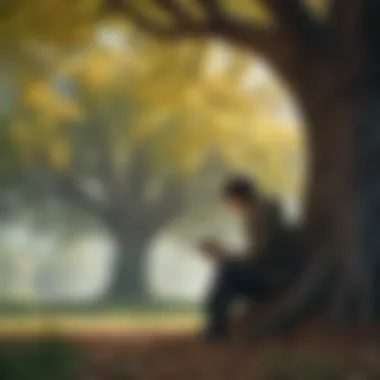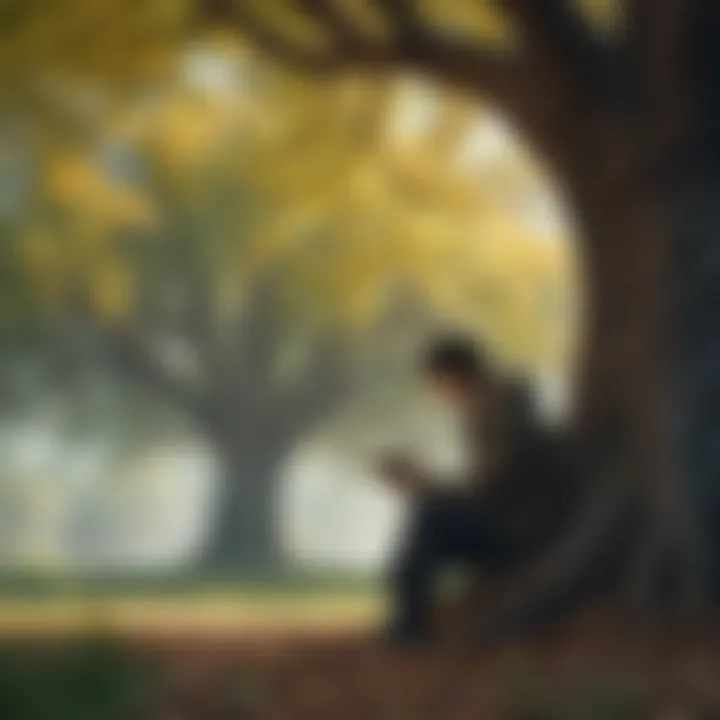Exploring Human Nature Through Literary Reflections


Intro
Literature serves as a mirror reflecting the intricacies of human existence. Within the pages of novels, poems, and plays, authors have captured the essence of what it means to be human—grappling with emotions, moral choices, and the often turbulent sea of relationships. Human nature is a vast and complex subject that encompasses our desires, fears, strengths, and weaknesses. This article aims to explore the depths of these themes as expressed in literary works, revealing the lessons we can learn about ourselves and the world around us.
By examining the critical reflections on human behavior found in literature, we come to understand not only the historical context in which these works were written, but also the timeless qualities of humanity that remain relevant today. From the struggles of tragic heroes to the dilemmas faced by everyday characters, the narrative fabric of literature provides a rich ground for inquiry.
Through probing character studies and philosophical exploration, we aim to dissect authors' perspectives on fundamental questions that shape our lives—questions about morality, justice, love, and identity. As we journey through this topic, we will uncover insights that extend beyond the written word, touching on the dynamics of personal development and societal interactions.
Before delving into specific literary works, it is essential to outline the key lessons that have emerged from this exploration of human nature in literature. Understanding these lessons will set the stage for a more profound engagement with both the texts and their implications for our lives and society.
Prolusion to Human Nature in Literature
The concept of human nature is central to the exploration of literature, acting as a mirror reflecting our deepest thoughts, emotions, and experiences. Literature provides us a unique lens through which we can examine not merely the actions of characters but the underlying motivations that drive those actions. Understanding human nature in literature is crucial for identifying the patterns of behavior, societal norms, and moral dilemmas that persist in our lives.
At its core, literature distills complex philosophical questions into narratives that resonate with readers across time and space. When authors grapple with human nature, they engage with themes that question existence, morality, and the essence of humanity itself. For students and educators alike, this exploration offers a profound opportunity to discuss and dissect the intricate fabric of our lives, fostering critical thinking and empathy.
Moreover, as we delve into various literary works, we gain invaluable insights into different historical and cultural contexts. By understanding how human nature is portrayed in literature, we can better comprehend our societal constructs and the ways these constructs shape individual behaviors. In a world that often feels disconnected, literature serves as a bridge, connecting readers to shared experiences and collective wisdom.
The importance of studying human nature in literature extends beyond academic inquiry; it also influences personal development. Through various narratives, we learn about resilience, empathy, and the complexities of human relationships. Engaging with these themes in literature allows us to reflect on our own lives, ultimately guiding us in navigating moral quandaries and fostering personal growth.
Defining Human Nature
Human nature, though a widely debated concept, is often understood as the core qualities, characteristics, and instincts inherent in all human beings. This collection of traits encompasses our capacity for reason, emotions, desires, and ethical understanding. When authors tackle the subject of human nature, they often emphasize both its dark and light elements, shedding light on our potential for both good and evil.
The idea of nature versus nurture plays a critical role in these discussions. Are we shaped more by our genetics or our environment? Does literature provide an escape from these realities, or does it compel us to confront them head-on? Through characters, plots, and settings, authors reflect the complexity of human nature and prompt readers to consider their own experiences and beliefs.
The Intersection of Literature and Humanity
Literature does not exist in a vacuum; it is deeply intertwined with the societies and cultures from which it springs. At its best, literature not only embodies the essence of the human experience but also critiques and challenges societal norms—acting as a catalyst for discussions about human behavior, relationships, and governance.
When we explore the intersection of literature and humanity, we find that stories often encapsulate universal truths about our existence. They allow us to live vicariously through characters, presenting scenarios that challenge our moral compass and illuminate the human condition. For instance, consider the works of Shakespeare, who artistically intertwined the chaos of human emotions with the social order of his time. His characters grapple with issues that remind us of our own vulnerabilities, aspirations, and failures.
In addition, literature has the power to spark change. Many notable works have historically swayed public opinion and inspired social movements, serving as a reflection of the human spirit's desire for justice, truth, and understanding. Through compelling narratives, literature fuels our discourse on what it means to be human, making it an indispensable tool for insight and enlightenment.
Historical Perspectives of Human Nature
Understanding human nature through the lens of history provides a foundation for analyzing how literature reflects the complexities of our existence. By examining past philosophies and literary movements, we uncover the roots of the themes and characterizations that persist in contemporary works. This exploration is essential as it offers a clarity that informs our understanding of how humanity has evolved in the arts and moral thought.
Philosophical Foundations
Philosophers have wrestled with the concept of human nature for centuries, proposing various theories on existence, morality, and the human condition. Thinkers like Aristotle and Plato laid groundwork that would echo throughout literary history.
For instance, Plato suggested that the essence of being human lies in the pursuit of truth and the realm of ideas. In contrast, Aristotle emphasized empirical observations, focusing on how humans interact with their environment.
In more recent times, existentialists like Jean-Paul Sartre posited that humans create their own essence through choices, underlining the freedom and responsibility inherent in our nature. This notion resonates in the work of writers who grapple with moral ambiguity and individual agency. Literature derived from these philosophical inquiries often reveals the beauty and chaos of human experience.
Key Insights from Philosophical Perspectives:
- Nature vs. Nurture: This long-standing debate questions whether our behavior is shaped more by biology or environmental factors.
- Existential Questions: Works that delve into existential themes challenge readers to confront their own existence and choices.
- Morality and Ethics: Philosophical discussions inform how characters navigate complex ethical dilemmas, illustrating the tangled web of human morality.
Literary Movements and Their Influence
Literary movements such as Romanticism, Realism, and Modernism have each shaped our understanding of human nature in unique ways.
Romanticism emphasized emotion and individualism, celebrating the hero's journey as a reflection of personal growth. Writers like Mary Shelley and Edgar Allan Poe examined the darker sides of human nature, pushing their characters to the brink of despair or ecstasy.
On the other hand, Realism sought to portray everyday life without embellishments, capturing the mundane yet profound aspects of human existence. Authors such as Leo Tolstoy and Gustave Flaubert painted intricate portraits of societal dynamics, highlighting the internal conflicts that define the human experience.
Modernism took a different turn, focusing on fragmentation and the disillusionment that followed the world wars. This movement forced writers to confront psychological depths and societal alienation, reflecting a profound sense of uncertainty in human nature.
Notable Literary Movements and Their Contributions:
- Romanticism: Focus on emotional depth and the exploration of subconscious desires.
- Realism: Depiction of life as it is, often revealing the intricate moral choices characters face.
- Modernism: A break from tradition that challenges perceptions of reality and self.
Through understanding these ideologies and movements, readers can better appreciate how literature serves as a mirror to humanity. This examination not only unveils the rich tapestry of themes but also enriches our grasp of human behavior, relationships, and the intricate dance of moral considerations.
Key Themes in Human Nature Literature
Key themes in literature often serve as a lens through which we can examine the intricacies of human nature. These themes are not merely decorative elements; they shape narratives and influence characters’ motivations, actions, and, ultimately, the story itself. Exploring these key themes allows readers to gain insights into moral dilemmas, societal interactions, and the continuous struggle of individuals to understand themselves and their place in the world. Here, we consider three significant themes: the duality of human existence, morality and ethics, and the complex nature of emotions.
The Duality of Human Existence
The duality of human existence encapsulates the idea that individuals often embody conflicting traits – both light and dark, hope and despair. This theme is prevalent in works ranging from Fyodor Dostoevsky’s Crime and Punishment to Mary Shelley’s Frankenstein.
In Dostoevsky’s novel, Raskolnikov wrestles with his superior intellect that leads him to justify murder, reflecting the tension between aspiration and moral obligation. Meanwhile, in Frankenstein, Dr. Frankenstein’s ambition contrasts sharply with the tragic consequences of his actions, illustrating humanity’s struggle between creation and destruction. This duality fosters a deeper understanding of human nature, emphasizing that conflicting desires exist within everyone, often driving the narrative forward.


"Every man is in some way a part of humanity’s struggle against its own nature."
This concept resonates not just in our literature, but in the daily lives of individuals who navigate their inner conflicts. It posits that understanding our own duality can lead to personal growth and, subsequently, a better society.
Morality and Ethics
The exploration of morality and ethics in literature poses essential questions about right and wrong, challenging readers to reflect on their values and the implications of their choices. Characters often face ethical dilemmas that reveal the complexities of moral reasoning.
For instance, in Harper Lee’s To Kill a Mockingbird, Atticus Finch stands as a moral beacon, defending an innocent man in a racially charged case despite social repercussions. His decisions force readers to confront their own perspectives on justice, fairness, and empathy. The exploration of morality in literature pushes the audience to consider the societal norms that shape our actions and thoughts.
Moreover, literature provides a unique platform to discuss the ambiguity of ethics in real-world scenarios. Such discussions encourage critical thinking and self-reflection, urging readers to evaluate their principles in various contexts.
Emotions and Their Complexity
Emotions are perhaps the most intricate aspect of human nature, and literature paints them vividly, revealing their multifaceted roles in guiding behavior and shaping relationships. Analyzing characters’ emotional landscapes offers invaluable insights into collective human experiences.
Take, for example, the profound emotional turmoil faced by protagonists like Jay Gatsby in The Great Gatsby. Gatsby’s longing for a lost love drives him into obsessive behavior, showcasing how love can inspire both greatness and desperation. Similarly, Virginia Woolf’s Mrs. Dalloway delves into the psyche of Clarissa Dalloway, where her reflections reveal layers of joy and sorrow intertwined in the fabric of her daily existence.
Through such character studies, literature invites us to consider how emotions are often inextricably linked to our identities and decisions.
In summary, the themes of duality, morality, and emotions not only serve as focal points for analysis but also act as mirrors, reflecting the complexities of our own lives. They foster a deeper connection with literature while enriching our understanding of human nature and its implications in the world around us.
Character Archetypes and Human Nature
Character archetypes serve as the fundamental building blocks of storytelling, offering readers familiar frameworks through which they can explore the complexities of human nature. When we delve into literature, it's not just about the plots and setting but rather about the essence of the characters who navigate life's tumultuous waters. These archetypes—like the Hero, Anti-Hero, Villain, and everyday individuals—allow writers to reflect on the spectrum of human behaviors, beliefs, and circumstances, laying bare the intricacies of the human experience.
By understanding these character types, we get a clearer sense of our own actions and motivations. The hero's journey often mirrors our pursuits in overcoming obstacles, while the anti-hero challenges us to reconsider our notions of morality and virtue. Villains expose the darker side of humanity, prompting a closer examination of the capacity for evil within us all. In contrast, everyday characters ground the narrative, illustrating that profound life lessons can emerge from the most ordinary experiences.
In this section, let’s dissect these archetypes to see how each uniquely enriches the broader theme of human nature in literature.
The Hero and the Anti-Hero
The hero archetype embodies courage, virtue, and the quintessential battle against adversity. Think of characters like Beowulf or Harry Potter, whose quests are not just external but internal as well. They are often depicted as models of strength and resilience. However, literature does not shy away from exploring the anti-hero, a figure riddled with flaws and moral ambiguity. Characters such as Walter White from Breaking Bad or Holden Caulfield from The Catcher in the Rye blur the lines between right and wrong, allowing readers to ponder significant questions about justification and the essence of redemption.
These two archetypes provide a fertile ground for understanding how heroism can manifest in various forms—sometimes uplifting, sometimes unsettling.
The Villain's Perspective
Villains provide a necessary contrast, forcing protagonists—and in turn, readers—to confront harsh realities of the human experience. Take the character of Iago from Shakespeare's Othello. Here, we can see a carefully crafted villain whose motives are as complex as they are malicious. By examining the traits and backstories of such characters, we glimpse the myriad conditions that shape their dark desires.
The villain’s perspective invites us to reflect on the nature of evil itself: Is it an inherent trait or a reaction to external conflicts? This exploration becomes a mirror, revealing our own fears and allowing us to interrogate the concept of morality within the societal constructs we inhabit.
"The greatest trick the devil ever pulled was convincing the world he didn’t exist." - The Usual Suspects
Everyday Characters and Their Lessons
Not every character dons a cape or wields a weapon. Everyday characters, such as the timid bookkeeper in The Fault in Our Stars or the disillusioned office worker in The Office, illuminate the beauty in the mundane. They embody the lived experiences of countless individuals, their struggles often echoing our own.
Through these ordinary characters, literature teaches us invaluable lessons about resilience, companionship, and the pursuit of happiness in everyday life. The simplicity of their lives facilitates profound realizations that resonate with us on a personal level. Observing their routines and choices, we can gather insights on empathy, self-acceptance, and even the importance of community.
In sum, understanding character archetypes is not merely a literary exercise; it's a lens through which we can examine the depths of human nature, prompting deeper introspection and understanding of the values that shape our actions and decisions.
Case Studies of Notable Works
Examining specific literary works provides profound insights into the intricacies of human nature. These case studies offer a lens through which we can analyze the motivations, fears, and desires that drive characters and, by extension, humanity itself. The beauty of literature is that it encapsulates not only the momentary struggles of individual characters but also larger societal questions and moral dilemmas. As we engage with these narratives, we begin to understand a deeper reflection of our own lives and the human condition.
Shakespeare's Influence on Human Psyche
Shakespeare’s works remain a cornerstone in the exploration of human nature. His characters often embody a blend of virtues and flaws, complex motivations that resonate with readers across centuries. For instance, consider the tragic figure of Hamlet. He grapples with profound existential questions and moral ambiguity, provoking readers to confront their own dilemmas of right and wrong.
- Moral Conflict: Hamlet’s indecision showcases the conflict between thought and action, highlighting how deeply internal struggles can influence behavior.
- Human Emotion: The raw emotions expressed by Shakespeare's characters allow a glimpse into the psyche, revealing fears and desires that often mirror our own.
By diving into Shakespeare's plays, we unearth nuances of jealousy, ambition, and love, making his work universally relatable and timeless.
"All the world's a stage, and all the men and women merely players."
– William Shakespeare
Tolstoy's Exploration of Morality
Leo Tolstoy, particularly in works like Anna Karenina and The Kreutzer Sonata, delves deeply into moral quandaries, illustrating the perpetual conflict between societal norms and personal integrity. His exploration of characters faced with ethical dilemmas highlights the weight of moral responsibility and the consequences of personal choices.
- Character Study: In Anna Karenina, Anna’s tragic fate raises questions about fidelity and societal expectations, compelling readers to reflect on the nature of love and betrayal.
- Moral Philosophy: Tolstoy emphasizes the search for morality as a fundamental aspect of human existence, asking readers to consider what it means to lead a good life.


Through Tolstoy's prose, we are invited to question our own moral compass, making his insights both profound and applicable to modern themes of personal integrity.
Existential Themes in Modern Literature
Modern literature often grapples with existentialism, a philosophical inquiry that examines human freedom, choice, and the search for meaning. Authors such as Albert Camus and Franz Kafka illustrate how individuals navigate an often absurd and indifferent world.
- Absurdism: In The Stranger, Camus presents Meursault, an emotionally detached character whose actions lead to an exploration of life's inherent meaninglessness.
- Isolation and Alienation: Kafka's The Metamorphosis focuses on Gregor Samsa, whose transformation into an insect serves as a metaphor for existential isolation and the struggle for identity.
These contemporary works compel readers to confront their own existence, pushing the envelope on what it means to be human in a complex, unpredictable world. By dissecting these narratives, we gain insight into our own lives and the shared human experience.
Psychological Insights Through Literature
Delving into psychological insights through literature provides us a lens to examine the intricacies of the human mind. Authors have long used their narratives as a means to reflect on behaviors, motivations, and the varied psychological conditions that shape human experiences. Understanding these insights enriches our comprehension of literature and it resonates with our personal journeys. The themes of identity, conflict, and emotional struggle often intertwine with character development, illuminating pathways to explore one’s psyche.
Through literature, we can observe how psychological elements manifest in characters’ arcs. This exploration is not merely academic; it allows readers to gain awareness about their own behaviors and emotions. When we encounter characters grappling with their internal demons or triumphing through adversity, we indirectly engage in our own introspective quests. This is where the beauty of literature lies—its capacity to facilitate reflection and understanding of ourselves as we navigate through various human experiences.
Behavioral Analysis of Characters
When we analyze characters’ behaviors, we pull back the curtain on the diverse motivations that drive them. For instance, in Crime and Punishment by Fyodor Dostoevsky, we witness Raskolnikov's turmoil. His act of murder is not just a plot device; it’s a probing exploration of guilt, morality, and redemption. Raskolnikov’s internal conflict serves as a mirror to our struggles with ethics and justification of actions.
Furthermore, examining the patterns of behavior can reveal broader societal truths. Authors such as Jane Austen, with her keen observations of social interactions and their consequences, open the door to understanding human behavior in its social context. Characters like Elizabeth Bennet embody traits that resonate with readers—her defiance, wit, and emotional growth provide us insight into resilience.
In literature, the behavioral analysis of characters often employs concepts from psychological theories, such as Maslow’s hierarchy of needs or Freud’s psychoanalytic theory. These theoretical frameworks help in decoding characters’ decisions and relationships, painting a vivid picture of human motivations.
The Role of Trauma and Recovery
Trauma is a potent theme that appears throughout literature, serving as a compelling backdrop against which characters navigate their realities. Works like The Bell Jar by Sylvia Plath immerse readers into the world of mental illness and the impact trauma has on identity. Esther Greenwood's narrative exposes the reader to the often-concealed struggles of mental health, illustrating that recovery is rarely linear and is marked by setbacks and growth.
Literature doesn’t shy away from portraying trauma as an intrinsic part of the human experience. In The Kite Runner by Khaled Hosseini, Amir’s betrayal of Hassan and its repercussions propel the narrative into a journey of guilt and eventual redemption. This arc reinforces the concept that personal growth sometimes stems from our darkest moments.
Moreover, fiction offers a safe space for readers grappling with their own traumas. By resonating with characters' experiences, readers can find solace and inspiration. The stories of recovery can act as roadmaps, guiding individuals through their own paths to healing.
“Literature is our window to the psychological battles we face, and through understanding characters, we can better understand our own complexities.”
In summary, psychological insights gained through literature elevate our appreciation of narratives while also fostering a deeper understanding of ourselves and others. Through behavioral analysis, we learn about motivations, and through explorations of trauma, we recognize resilience, reaffirming the vital role storytelling plays in the human experience.
Human Nature and Society
When we survey the landscape of human nature through literature, we inevitably stumble upon the intricate web of social constructs that shape our perceptions and interactions. It's like peeling an onion; each layer reveals deeper truths about ourselves and the society we inhabit. Understanding how literature portrays these constructs is vital. It not only helps us grasp the underlying moral dilemmas faced by characters but also reflects our daily lives and the choices we make.
A key aspect to consider is the impact of social norms on individual behavior. Literature acts as a mirror, reflecting societal expectations and the pressures that come with them. Characters often grapple with the demands of their society, which can lead to profound insights about self-identity and moral conflict. Consequently, engaging with these portrayals allows readers and scholars to examine their own lives and question the social fabrics they navigate.
- Social Interaction: How we relate to one another is deeply influenced by the norms set by society. Literature that illustrates this can offer clarity on the complexities of friendships, love, and power dynamics.
- Identity Formation: Characters in literature frequently struggle with their identities against societal expectations. These narratives teach readers about the delicate balance between conforming to societal norms and pursuing personal authenticity.
- Cultural Reflection: The stories we consume often encapsulate the zeitgeist of their time, providing a unique lens through which to view historical and cultural shifts.
Social Constructs and Their Impact
Social constructs play a pivotal role in framing the complexities of human behaviors and relationships in literature. They dictate what is deemed acceptable or taboo, influencing character motivations and decisions. Consider, for instance, gender roles that are prevalent across various literary works. In many novels, female characters may find themselves constrained by societal expectations of femininity. This not only sparks character development but also prompts readers to reflect on their own societal contexts.
- Examples from Literature: In works like Charlotte Perkins Gilman’s "The Yellow Wallpaper," social constructs surrounding mental health and women's roles manifest vividly, showcasing the repercussions of societal expectations.
- Interpersonal Dynamics: Social constructs shape how characters navigate their relationships, resulting in conflicts that provide fertile ground for discussion about love, loyalty, and betrayal.
"Literature reveals the paradoxes within society, where norms become cages or ladders for the individuals trying to find their footing."
Literature as a Reflection of Societal Norms
Literature is often regarded as a window to the prevailing societal norms of its time. It captures human experiences that transcend generations, giving voice to the issues that haunt every epoch. Through various genres, authors confront and critique societal standards, pushing readers to consider the implications of their own societal constructs.
- Historical Context: Consider how texts like George Orwell’s "1984" critique governmental control and societal conformity, offering readers a stark warning against oppressive social frameworks.
- Change and Resistance: Literature often showcases characters who challenge societal expectations. For example, Jane Austen’s heroines navigate a world defined by marriage and wealth, serving as critiques of the social norms that dictate women's futures.
- Modern Perspectives: In contemporary literature, authors frequently interrogate issues like race, class, and gender, fostering discussions on social justice and equality.
Exploring human nature through these narratives deepens our understanding of ourselves and the world at large. Readers can often draw parallels between the lives of literary figures and their own, offering invaluable lessons on empathy, resilience, and critical thinking.
Lessons for Personal Development
In literature, the intricate dance between character and circumstance presents us with a mirror to our own lives. By examining the choices and challenges faced by characters, readers can uncover valuable lessons that have real-life relevance. Literature acts not only as a reflection of society but as a guide for personal growth. It helps us navigate the murky waters of morality, ethics, and emotions, facilitating a deeper understanding of ourselves and others.
When we engage with literary works, we are often drawn into the minds of characters as they grapple with profound dilemmas. These narratives can highlight aspects of human nature that resonate on a personal level, providing insights that can shape our own decisions and relationships. Whether it's the sacrifice made by a hero or the moral ambiguity of an anti-hero, these stories can offer powerful perspectives that challenge our own views and inspire growth.
Some key elements to consider in this context include:
- Self-Reflection: Literature encourages readers to reflect on their own beliefs and values in light of the experiences portrayed in the stories. By confronting different viewpoints through characters, we can gain a broader perspective on what it means to be human.
- Decision-Making Skills: Observing characters navigate moral dilemmas allows readers to examine their own decision-making processes, fostering critical thinking and ethical reasoning.
- Emotional Intelligence: Engaging with literature enhances our ability to recognize and understand emotions, both in ourselves and in others. This emotional awareness is crucial for personal development as it informs our interactions.
In 'A Tale of Two Cities' by Charles Dickens, for example, we see the stark contrast between sacrifice and revenge. Sydney Carton’s choice to lay down his life for another illustrates the ultimate act of selflessness. This act not only speaks to the potential for good in humanity but also offers a touchstone for readers to consider the impacts of their own actions in relation to others.


Here's how literature can serve as a tool for personal development:
- Engagement with Complicated Issues: By exploring themes of love, betrayal, and redemption in various works, readers can confront and grapple with these topics in their own lives.
- Inspiration for Positive Change: Stories of redemption and personal growth can motivate readers to seek out their own paths of improvement.
- Understanding of Human Experiences: Literature helps cultivate empathy and awareness of diverse experiences, appealing to our shared human nature.
"The best way to find yourself is to lose yourself in the service of others." – Mahatma Gandhi
In sum, the relationship between literature and personal development is robust and multifaceted. Each book offers a unique lens through which we can examine our lives, revealing lessons that can guide us towards becoming better versions of ourselves.
Applying Literary Lessons to Life
The process of applying literary lessons to our lives involves more than merely understanding the plot or character motives. It's about translating those insights into actionable knowledge that impacts our daily choices and interactions.
For instance, when reading George Orwell’s '1984', we not only encounter a narrative about totalitarianism but also learn about the importance of being vigilant in a society bombarded with information. This lesson can be a foundational principle that helps us navigate our own complex world, encouraging critical scrutiny of the data we are presented with daily.
As readers, we should ask ourselves:
- How do the characters’ choices mirror decisions I face?
- What themes resonate with my life experiences?
- Can I draw parallels between fictional challenges and my own?
Making these connections not only enhances understanding but also reinforces our ability to implement changes in our lives. For example, in 'Pride and Prejudice' by Jane Austen, the growth in Elizabeth Bennet's character teaches us about the virtues of introspection and the dangers of prejudice, concepts we can embrace to foster better relationships and personal growth.
Cultivating Empathy Through Reading
Empathy is the bedrock of human connection, and literature serves as a powerful vehicle for fostering this quality. The ability to step into another's shoes, to feel what they feel, is enhanced when we engage deeply with characters in books. This immersion provides readers with a spectrum of human experiences, allowing them to encounter lives and struggles far removed from their own.
By immersing ourselves in diverse narratives, we can break down biases and prejudice, leading to:
- Enhanced Understanding: Literature exposes us to cultures, contexts, and experiences that differ from our own, encouraging a broader worldview.
- Greater Compassion: Characters who face hardships, such as those in Khaled Hosseini's 'The Kite Runner', demand our sympathy and reflection. Their struggles resonate deeply with humanity, reminding us of our shared vulnerabilities.
- Social Awareness: Stories of societal injustices prompt us to engage with and challenge the status quo in our own environments.
Ultimately, the goal of cultivating empathy through reading isn't just about feeling for others—it’s about acting with kindness and understanding in our lives. As we decode the layers of characters and narratives, we begin to recognize the multitude of factors that shape human emotions and decisions, which in turn helps us forge meaningful and sympathetic connections in our own world.
The Future of Human Nature in Literature
The exploration of human nature in literature is not a static endeavor; it evolves with time, influenced by societal changes and technological advancements. As we navigate an increasingly complex world, the narratives we craft and consume will continue reflecting the shifts in our understanding of humanity. This section aims to underscore the significance of contemplating the future of human nature in literature, emphasizing the implications that new trends and emerging technologies have on storytelling.
Emerging Trends in Literature
Literature today stands at a crossroads, shaped by various emerging trends. Here are key elements to observe:
- Diverse Voices: There's a growing emphasis on amplifying underrepresented voices in literature. This movement not only expands the narratives available to readers but also provides deeper insights into the multifaceted nature of human experiences.
- Blurring Genres: The lines between genres are becoming increasingly fluid. As authors experiment with mixing elements of fiction, poetry, and non-fiction, new forms emerge that challenge traditional storytelling methods and reveal complex perspectives on human nature.
- Focus on Mental Health: Contemporary literature often reflects an acute awareness of mental health issues, prompting discussions that were once considered taboo. Characters navigating trauma, anxiety, or depression serve to humanize struggles that are often overlooked, fostering greater empathy in readers.
These trends illustrate how literature adapts to societal needs and offers a platform for diverse explorations of human emotions and morality.
Technology's Role in Storytelling
As technology advances, it significantly alters how stories are told and consumed. The integration of technology in literature has numerous implications:
- Digital Formats: The popularity of e-books and audiobooks allows readers to engage with literature in myriad ways. Through these formats, literary experiences are becoming more accessible, particularly for those who may struggle with traditional reading.
- Interactive Storytelling: The rise of digital platforms encourages authors to experiment with interactive narratives. Readers can now influence story outcomes, thereby reshaping their connection to the characters and plotlines. This interactivity could lead to a deeper understanding of various human perspectives.
- Online Communities: Social media and online forums offer spaces for readers to discuss literature, share interpretations, and even connect with authors. These interactions foster an environment where literature becomes a communal exploration of human nature, enriching readers' insights and perspectives.
"The narratives of the future are not merely stories; they are reflections of our evolving identities and our shared human experience in a digital age."
Looking ahead, the intersection of technology and literature promises to reshape our understanding of human nature. As readers and creators, we must remain open to these transformations, embracing the challenges and opportunities they present. In this way, the future of literature not only holds a mirror to who we are but also influences who we can become.
Epilogue
In wrapping up this exploration of human nature as depicted through literature, it's essential to highlight the myriad dimensions that authors have examined over the centuries. Literature is more than just words on a page; it's a mirror reflecting the complexities and intricacies of the human experience. Texts across various cultures and eras have served as a platform for discussing the intrinsic qualities that define us, including our virtues, flaws, and moral quandaries.
Recognizing these elements is critical because it enables readers to engage with the material on a deeper level. The moral dilemmas faced by characters often prompt us to confront our own beliefs and decisions, fostering a kind of introspection that enhances personal growth. Through these narratives, one learns that human experiences are not monolithic but rather a tapestry woven from diverse threads of emotion and thought.
Furthermore, literature can act as a touchstone for societal values, questioning norms, and igniting dialogue about issues that have persisted through time. Here, the intersection of narrative and psychoanalysis might yield insights into our behavior patterns, equipping us with the wisdom necessary for navigating our own lives.
In a world increasingly dominated by quick responses and superficial interactions, literature remains a sanctum for contemplating the deeper meanings of existence. This wealth of insights may encourage a greater engagement with not only the texts themselves but also with humanity around us.
Recap of Key Insights
- Literature Reflects Human Complexity: Novels and poems encapsulate the multifaceted nature of human experience, allowing readers to navigate through emotional landscapes.
- Moral Dilemmas Lead to Self-Reflection: Characters often grapple with ethical choices that can resonate with the reader's personal life, encouraging critical thinking.
- Cultural Insights Shape Understanding: The societal norms depicted in literature can shed light on the present, illustrating how history influences current human behavior.
"Through the looking glass of literature, we see not just the world, but ourselves in shades we may have never acknowledged."
The Enduring Nature of the Human Experience in Literature
Human experience, explored through literature, possesses a timeless quality. The themes recur similarly across borders and ages, resonating with readers regardless of context. From Shakespeare's tragedies outlining human flaws to contemporary novels dissecting technology's role in relationships, these stories encapsulate essential truths about being human.
The universality of love, betrayal, struggle, and redemption signifies that, regardless of advancements in technology or shifts in societal structures, the core of what it means to be human remains unchanged. This, in essence, is why literature continues to be a vital aspect of individual and collective experience. It fosters not just empathy, but a shared cultural understanding that transcends generations.
Moreover, as literature evolves, new narratives arise from the intersection of diverse narratives. The globalized world invites cross-cultural examinations that add richness to the exploration of human nature. In this way, literature is not static; it grows and morphs just as society does, reflecting the ongoing journey of humanity.
To forge connections with others, one must first understand themselves, and literature provides that introspective space. The power of a narrative to touch the heart and engage the mind remains unmatched, promising that as long as humanity exists, literature will chart its course through the complexity of human nature.



